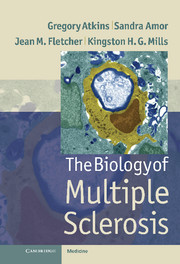11 results
A New Kaolin Deposit in Western Africa: Mineralogical and Compositional Features of Kaolinite from Caluquembe (Angola)
-
- Journal:
- Clays and Clay Minerals / Volume 67 / Issue 3 / June 2019
- Published online by Cambridge University Press:
- 01 January 2024, pp. 228-243
-
- Article
- Export citation
Preface
-
- Book:
- The Biology of Multiple Sclerosis
- Published online:
- 05 December 2012
- Print publication:
- 08 November 2012, pp vii-viii
-
- Chapter
- Export citation

The Biology of Multiple Sclerosis
-
- Published online:
- 05 December 2012
- Print publication:
- 08 November 2012
Chapter 2 - Neuropathology of multiple sclerosis
-
-
- Book:
- The Biology of Multiple Sclerosis
- Published online:
- 05 December 2012
- Print publication:
- 08 November 2012, pp 11-34
-
- Chapter
- Export citation
Chapter 7 - Epilogue: conclusions and future directions
-
-
- Book:
- The Biology of Multiple Sclerosis
- Published online:
- 05 December 2012
- Print publication:
- 08 November 2012, pp 122-127
-
- Chapter
- Export citation
Index
-
- Book:
- The Biology of Multiple Sclerosis
- Published online:
- 05 December 2012
- Print publication:
- 08 November 2012, pp 128-132
-
- Chapter
- Export citation
The Biology of Multiple Sclerosis - Half title page
-
- Book:
- The Biology of Multiple Sclerosis
- Published online:
- 05 December 2012
- Print publication:
- 08 November 2012, pp i-ii
-
- Chapter
- Export citation
Copyright page
-
- Book:
- The Biology of Multiple Sclerosis
- Published online:
- 05 December 2012
- Print publication:
- 08 November 2012, pp iv-iv
-
- Chapter
- Export citation
Contents
-
- Book:
- The Biology of Multiple Sclerosis
- Published online:
- 05 December 2012
- Print publication:
- 08 November 2012, pp v-v
-
- Chapter
- Export citation
Chapter 3 - Experimentalautoimmune encephalomyelitis
-
-
- Book:
- The Biology of Multiple Sclerosis
- Published online:
- 05 December 2012
- Print publication:
- 08 November 2012, pp 35-61
-
- Chapter
- Export citation
The Biology of Multiple Sclerosis - Title page
-
-
- Book:
- The Biology of Multiple Sclerosis
- Published online:
- 05 December 2012
- Print publication:
- 08 November 2012, pp iii-iii
-
- Chapter
- Export citation



